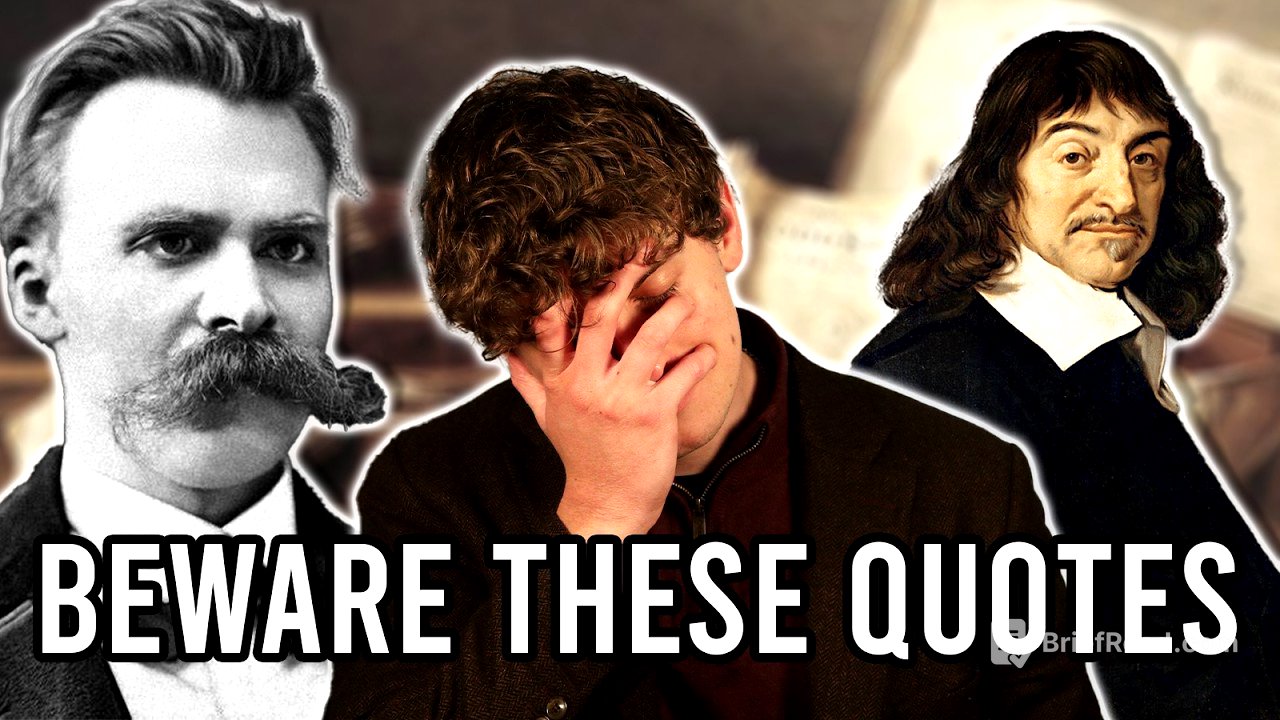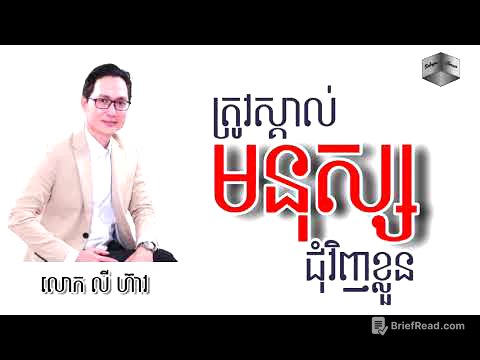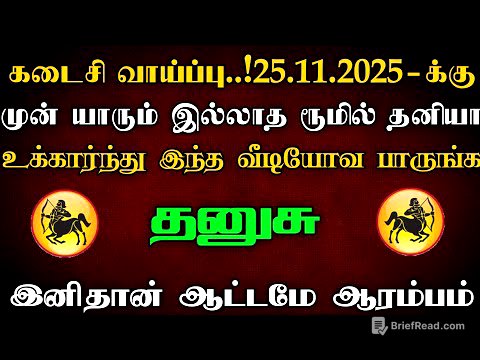TLDR;
This video addresses the common misuse and misinterpretations of famous philosophical quotes. It explores the original context and intended meaning behind seven well-known quotes from philosophers like Socrates, Nietzsche, Ockham, Descartes, Sartre, Wittgenstein, and Dostoevsky. The video aims to provide a more accurate understanding of these quotes and their philosophical significance.
- Socrates: Physical fitness should be for the service of others.
- Nietzsche: "God is dead" refers to the decline of religious influence and the potential for humanity to create its own values.
- Ockham's Razor: Simplicity is a secondary metric.
- Descartes: "Cogito, ergo sum" is a starting point, not the entirety of his philosophy.
- Sartre: "Hell is other people" is about the unavoidable and potentially disturbing gaze of others.
- Wittgenstein: "The limits of my language are the limits of my world" refers to the limits of truth-evaluable statements.
- Dostoevsky: Suffering can be ennobled if it brings us closer to universal love.
Misunderstandings and Philosophy [0:00]
The video begins with an introduction to the topic of misconstrued philosophical quotes. The author expresses his concern that many famous and insightful quotes from philosophers are routinely misused, often in ways that contradict their original intent. He selects seven quotations from various philosophers that he believes are commonly misunderstood in popular discourse. The author also mentions that it is his birthday and he is excited to discuss philosophy.
Socrates in the Gym [3:04]
The video addresses the quote from Socrates, "No man has a right to be an amateur in the matter of physical training." While physical excellence was indeed emphasized in ancient Greek philosophy, particularly by Socrates, the context of this quote is often missed. The quote originates from Xenophon's "Memorabilia," where Socrates is actually admonishing a young man for neglecting his physical training, emphasizing that physical fitness is an instrumental good, serving both the community and fostering intellectual discovery. The dialogue suggests that staying fit should be for what we can do for others, a less egoistic message than the quote in isolation suggests.
God is Dead and We Have Killed Him [8:09]
The video discusses Nietzsche's famous quote, "God is dead, and we have killed him." The most common misunderstanding is that it signifies a need for religion or a feeling of hopelessness. Nietzsche is not talking about a metaphysical death of God, but rather the wave of non-belief that he predicted would follow the mature enlightenment. Mankind itself will fill the role that God had and become the authors of morality and craft our own values rather than having them handed down to us by a religion. Nietzsche saw the death of God as both a terrifying risk and a fantastic opportunity. He worried that without God, humanity would simply cease to have values and decay into nihilism or hedonism.
Ockham's Razor [13:03]
The video explains Ockham's Razor, often summarized as "Entities must not be multiplied beyond necessity." The core idea is that, all else being equal, simpler theories are preferred over more complex ones because each proposed entity carries an epistemic risk of non-existence. The misunderstanding arises when simplicity is valued higher than more useful or more truth-tracking properties like empirical adequacy or predictive success. Simplicity is a secondary metric used to arbitrate between theories of equal or similar empirical adequacy and not something that in itself makes a theory more likely to be true.
Cogito Ergo Sum [18:43]
The video discusses Descartes' "Cogito, ergo sum," meaning "I think, therefore I am." Descartes used this as the starting point for his epistemic system. The first misconception people often have is that the argument starts with thinking. In the meditations, Daycart originally constructed the argument more along the lines of doubt. In popular discourse, people say that this is the only thing Daycart thought we could have knowledge of, but this is a misconception. While this is Daycart's starting point, it is not where his philosophy ends.
Hell is Other People [24:13]
The video explores Jean-Paul Sartre's quote, "Hell is other people," from his play "No Exit." The play depicts hell as a room where three characters are trapped, each perfectly positioned to undermine the others' self-conceptions. In popular discourse, the phrase has come to mean a general contempt for others and a preference for one's own company, but that's not quite what Sartra means. For Sartra, the gaze of other people is both unavoidable yet also potentially rather disturbing. Sartra advocates for a full recognition of other people's agency and suggests that this is part of an existentially fulfilled life.
The Limits of My Language [29:53]
The video discusses Ludwig Wittgenstein's quote, "The limits of my language are the limits of my world." In popular speech, it tends to be about everyday language. However, this is from early Vickenstein, and so none of the words in the sentence mean what they would normally mean in our everyday language. By world here Vickenstein means the collection of true propositions. Additionally by language Vickenstein does not mean the full breadth of human expression but rather the collection of truth evaluable statements.
Your Worst Sin [34:40]
The video examines the quote from Dostoevsky's "Crime and Punishment": "Your worst sin is that you have destroyed and betrayed yourself for nothing." It comes up a lot in those quoty Instagram pages, and the comments often interpret it as Dstoyvki saying that all suffering is pointless and it's all for nothing. This plays into the popular yet deeply mistaken picture of dsttoyki as a hopeless writer. The primary force in Dostsyky's ethical system is active love. This is a love that is not just in words but in deeds. And one of the key ways that DSVski shows this active love in his books is through sacrifice and suffering on another's behalf.









